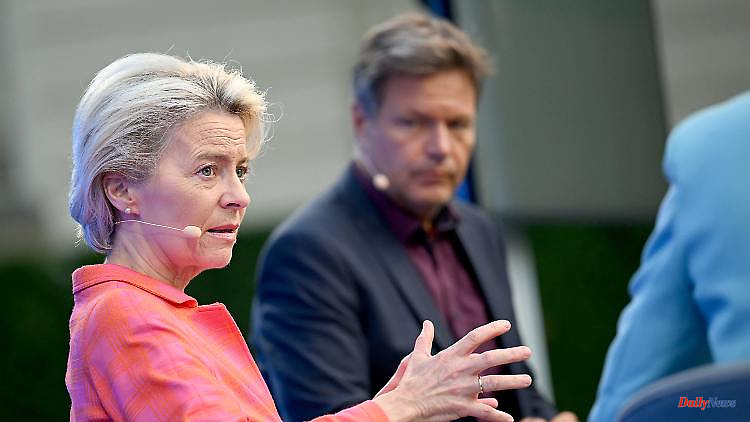EU Commission President Ursula von der Leyen wants to skim off high profits from energy companies. These excess profits are intended to support people with low incomes. However, this should not happen as part of a tax, said the politician on the ZDF talk show Maybrit Illner.
Politicians in Germany have been arguing for weeks about introducing an excess profit tax. It should be paid by companies that make profits without having made them themselves. The FDP and the Union parties have so far been against it. Now EU Commission President Ursula von der Leyen wants to achieve exactly that. “We want to skim off the profits that are now shooting through the roof (at energy companies) and that cannot be reinvested at all,” she said last night on the ZDF talk show Maybrit Illner. However, they do not want to introduce a tax on this. Corresponding proposals from the EU had previously become known through a so-called "non-paper". A non-paper is a kind of discussion recommendation.
The EU energy ministers are to discuss this for the first time on September 9th. According to von der Leyen, the EU wants to intervene directly in the electricity market with an "emergency instrument" and reduce the "excessive influence of expensive gas on electricity prices". This is also mentioned in the non-paper, which also calls for a significant reduction in power consumption.
The electricity price is calculated throughout Europe according to the "merit order principle". It says: The most expensive power plant that is needed to cover demand determines the price. All power plants can demand that, even if they could deliver much cheaper. The providers with the cheapest and most efficient processes should be rewarded, while the expensive power plants should still be kept in the market. The rule has particularly helped those who generate electricity from renewable sources. Because gas prices are now extraordinarily high, not only are electricity prices rising massively, but also the profits of cheap energy producers. Both the excess profit tax and the planned EU regulation should be about these profits. "The important thing is that we get through this winter now and that Russian President Putin can no longer blackmail us with his fossil fuels."
Apparently, previous opponents of an excess profit tax can also make friends with the EU regulation. FDP parliamentary group leader Christian Dürr pointed out to Maybrit Illner that the price of electricity had increased twentyfold in the last few weeks. "No company or private household can do that." Dürr therefore advocated a new "electricity market design". For the companies, "these are of course not taxable profits, but rather absurdly high prices from market conditions, where I would be very much in favor of changing exactly that within the electricity market." Dürr pointed out that by paying the EEG surcharge, electricity customers would have supported companies that generated electricity from renewable energies. Now the "conventional electricity customers" needed the support of the renewables. "You have to talk about it and it has to work in the end."
Greens leader Ricarda Lang can also get a lot out of the idea. "I was the first to advocate an excess profit tax." For them it is important "that we approach the excess profits", whether with a tax or via the levy.












